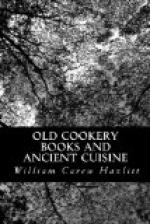The Phagetica of Ennius, of which fragments remain, seems to be the most ancient treatise of the kind in Roman literature. It is supposed to relate an account of edible fishes; but in a complete state the work may very well have amounted to a general Manual on the subject. In relation even to Homer, the Phagetica is comparatively modern, following the Odyssey at a distance of some six centuries; and in the interval it is extremely likely that anthropophagy had become rarer among the Greeks, and that if they still continued to be cooking animals, they were relinquishing the practice of cooking one another.
Mr. Ferguson, again, has built on Athenaeus and other authorities a highly valuable paper on “The Formation of the Palate,” and the late Mr. Coote, in the forty-first volume of “Archaeologia,” has a second on the “Cuisine Bourgeoise” of ancient Rome. These two essays, with the “Fairfax Inventories” communicated to the forty-eighth volume of the “Archaeologia” by Mr. Peacock, cover much of the ground which had been scarcely traversed before by any scientific English inquirer. The importance of an insight into the culinary economy of the Romans lies in the obligations under which the more western nations of Europe are to it for nearly all that they at first knew upon the subject. The Romans, on their part, were borrowers in this, as in other, sciences from Greece, where the arts of cookery and medicine were associated, and were studied by physicians of the greatest eminence; and to Greece these mysteries found their way from Oriental sources. But the school of cookery which the Romans introduced into Britain was gradually superseded in large measure by one more agreeable to the climate and physical demands of the people; and the free use of animal food, which was probably never a leading feature in the diet of the Italians as a community, and may be treated as an incidence of imperial luxury, proved not merely innocuous, but actually beneficial to a more northerly race.
So little is to be collected—in the shape of direct testimony, next to nothing—of the domestic life of the Britons—that it is only by conjecture that one arrives at the conclusion that the original diet of our countrymen consisted of vegetables, wild fruit, the honey of wild bees—which is still extensively used in this country,—a coarse sort of bread, and milk. The latter was evidently treated as a very precious article of consumption, and its value was enhanced by the absence of oil and the apparent want of butter. Mr. Ferguson supposes, from some remains of newly-born calves, that our ancestors sacrificed the young of the cow rather than submit to a loss of the milk; but it was, on the contrary, an early superstition, and may be, on obvious grounds, a fact, that the presence of the young increased the yield in the mother, and that the removal of the calf was detrimental. The Italian invaders augmented and enriched the fare, without, perhaps, materially altering its character; and the first decided reformation in the mode of living here was doubtless achieved by the Saxon and Danish settlers; for those in the south, who had migrated hither from the Low Countries, ate little flesh, and indeed, as to certain animals, cherished, according to Caesar, religious scruples against it.




